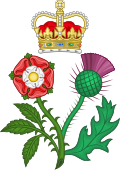Harley ministry
Prime Minister
.Captain General the Duke of Marlborough, served in the cabinet as Master-General of the Ordnance
until his controversial dismissal.Queen Anne
's death.
The Harley (or Oxford–Bolingbroke) ministry was the
Kit-Kat Club
.
Peace treaty
The ministry vigorously pushed for a peace to end the
Robert Walpole over charges of profiteering and had him imprisoned in the Tower of London
for a period.
In December 1711 the government controversially dismissed
notorious duel in Hyde Park with the Whig politician Lord Mohun
.
Fall and aftermath
The government fell following Anne's death in 1714. The new king,
impeached by Parliament, and remained in the Tower of London until 1717. Matthew Prior
who had played an important part in the negotiating the Utrecht treaty was also imprisoned.
Several former members of the government were involved or caught up in the
James III, the former Scottish Secretary the Earl of Mar led the uprising in Scotland while Sir William Wyndham
was arrested as a potential leader of the revolt in England.
Principal ministers
- ^ Cook and Stevenson also list Edward Nicholas as Paymaster-General in 1713, but his office was that of Paymaster of Pensions.[2]
References
- ^ Chris Cook and John Stevenson, British Historical Facts 1688–1760, Macmillan 1988, pp. 35–36.
- J. C. Sainty, Paymaster of Pensions 1703-1782. Accessed 9 December 2018.


